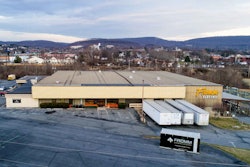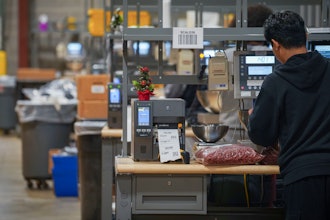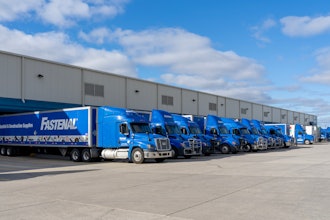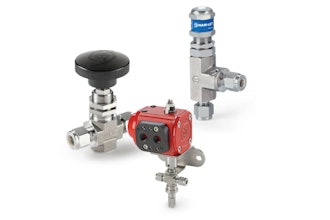York, PA-based motors and PT distributor Transply was built through one family’s hard work and entrepreneurial spirit – and doesn’t show signs of slowing.
Transply is not the only independent industrial distributor with humble roots, but it just may be the only one to start its business in a rural Pennsylvania chicken coop. By 1972, brothers Dean and Ray Gross had grown weary of working for other people – the type who chewed out Dean for rushing an order same-day for a customer who was in a jam. This kind of customer service (or lack thereof) didn’t sit well with the Gross brothers, and they took their skills and business acumen out of York to Dillsburg, PA where they set up a team and started looking for suppliers.
It wasn’t always easy. In fact, the brothers first problem was that many major manufacturers were not looking for distributors at the time. There was a narrow pool of suppliers at the outset, and they were forced to purchase sprockets shipped in 55 gallon drums all the way from Oregon; they could only get one power transmission line. “Nobody heard of many of the manufacturers we represented and so we had to really sell,” recalls Dean, who still serves as Transply’s CEO. Some of the first manufacturers included then-unknowns Eaton Power Transmission and Baldor. “We made our living selling secondary products to small- and medium-sized businesses. We called on companies where the owner and the manager really cared about expenses and the quality.” This type of entry into the market required a lot of road time, a lot of hard work, and a family who was willing to do every job in the business in order to nurture a solid reputation for the Transply name.
In a way, Transply still brings the family farm mentality to its operations. The management team is comprised of Ray Gross’s children Brian Gross (president) and Susan Crone (VP of human resources), as well as her husband Matthew Crone (outside sales). Rounding out the company leadership is Dean’s brother-in-law Monatto Smith (VP of sales) and nephew, Ethan Harlacher (customer service manager). But if you think this is nepotism, you’re wrong: each has decades of experience with Transply. Dean recalls Brian’s first task – at 14 years old – to paint the ceiling above the rafters of the chicken house where Transply kept its inventory; at nine years old, Susan was putting labels on catalogs. For Brian and Susan, joining the family business was a natural fit.
According to Brian, college meant paying someone to “tell us what to read and what to do to run our business. Or we could get out and do it and grow with it. And that’s what we did.”
Grow With It
Growth has been a steady constant for Transply over the years, and the small company of the mid-70s has advanced into a distributorship of eight locations and 70 employees, with sales over $26 million in 2012. Most recently, Transply opened a new branch in Winchester, VA and added 6,000 sq ft. of warehouse space to its Norristown location to service the surrounding counties better. Transply selects branch locations based around their abilities to service customers with same- or next-day deliveries. “We have a delivery fleet of vehicles and make daily deliveries, which nobody is really doing anymore,” says Smith. “I think we do a lot of things that people used to do that they don’t do anymore.”
Case in point: All of Transply’s branches are stocking locations, and inventory for this company is more than just the fast moving core products – “not just the current inventory,” says Smith, “but also some of the oddball stuff the customer might be looking for.” Opening more branches helps justify the stocking of some of the slower moving items, but for Transply the key driver here is customer service, an approach that comes with good old fashioned bend-over-backwards salespeople. “When you call Transply, a real person answers the phone,” explains Smith. “You get an inside sales person who can help you right away.” The core of Transply’s inside sales group have fifteen years of experience or more, and are trained to the point where they can truly help customers identify what they have and what they need. “We deal with a lot of maintenance people,” says Brian. “When maintenance people call, they want to talk to somebody who knows something. He wants a product that’s going to fix his problem.”
The knowledge base, combined with a small company’s flexibility, has resulted in a team of inside reps who can make decisions on the fly with a customer’s unique needs in mind. “We can make decisions on the phone,” says Harlacher. “We don’t need to ask Dean or call ‘corporate.’ It makes it nice that we have some flexibility here.”
Transply’s outside sales force focuses on being a visible resource to their customers through knowledge of product and commitment to the customer’s needs. As the company looks to increase sales in its existing branches through growing its sales force, Transply is challenged to find the right talent. Based on the great talent pool in inside sales, there is opportunity to grow from within. And when Transply hires from the outside, “We look for good basic people,” says Dean. “Give me a farm boy and I’ll make a salesman out of him. They understand basic mechanics; they’ve got a work ethic… we’ve had good luck hiring from outside the industry, rather than from competitors. You don’t have to ‘un-teach’ people.”
Whether it’s for teaching or “un-teaching,” Transply is kicking around the idea of hiring a full-time trainer for its branches. “It’s all with the goal of getting fully trained employees in every branch and allowing for future growth.” Additional training for sales reps comes via cross-functional areas. According to Susan, recruiting and training are some of the biggest challenges the business faces, “especially if they’re not familiar with our business.”
And it seems once they’re in the door, they want to stay at Transply. Perhaps it’s the little touches of home, like the on-site chef who prepares a lunch-time meal for the employees at the York, PA headquarters. What started as a matter of necessity – “where we were (in Dillsburg), it was ten miles in any direction to the nearest restaurant,” says Brian – has now become a nice perk for employees. The added perk is for Transply, who can continue to invite customers into the warehouse throughout the day while staggering lunch breaks on-site. This means the branch doesn’t clear out for thirty minutes to an hour each mid-day.
Old-Fashioned Service in the Modern Day
While Transply clings to its core values, the company also looks for ways to broaden its capabilities. That said, it’s not the kind of business to be an early adopter. “We’re never on the cutting edge, and that’s intentional,” explains Brian. “We watch to see what other companies are doing, then we improvise and try to determine – how does it fit for us? We hear their horror stories and try to learn from them.”
Luckily, this family-owned business has some flexibility to make decisions around investments like ecommerce. “It’s another opportunity to reach out and touch customers,” says Smith of Transply’s website. One of the ways Transply gave it its own touch is around inventory visibility, a feature many competitive distributors do not offer on their sites. “The customer knows that we have it, not that we represent it and it’s going to be shipped from a manufacturer and you’re going to get it in a couple of days,” says Smith. Another point of pride is the website’s product descriptions, something Transply considers to be quite robust because “a lot of customers don’t know what they’re looking for, and a lot of websites are very vague and leave the customer wondering if it’s the right or the wrong thing. With ours, if you need a 50B18, it’s going to tell you that it has 18 teeth, has a B hub, it’s for #50 roller chain, and it is a sprocket – plus there’s going to be a picture of it.”
Another positive of the website is internal: “It makes training really easy,” says Dean. “If someone calls for a 50B18 sprocket, the inside salesperson can key it in, and tell them what the price is without any more training.”
Ultimately, the site has been a great way to improve access for the customer base, most of which is in “places we can get to within two hours, to be able to support our inventory,” says Brian. “Some might say we’re control freaks, but we make our own transfers to our branches each day. We have a gentleman that leaves here from York, goes to Norristown, then Allentown, and then back to York. He might go to Martin Sprocket & Gear for a pickup, or to other manufacturers with warehouses in the area.”
Adds Harlacher, “One of the reasons I think we’re so successful is we get stuff there the same day that anybody else can get there the next day. I think people use us for that reason.”
To compete against the national contracts, Transply has established a relationship with IBC. IBC, a national buying and marketing group for independent distributors and manufacturers, has helped Transply land a few national accounts that felt out of reach for many years. “We can offer the national accounts local inventory and product knowledge. Along with the help of IBC, the end user can save money plus have the option to earn minority credits. It’s just another option for us to support the national end user accounts with locations in our trading area,” says Smith. “As far as our company goes, there are a lot of little things we do well in order to compete with the big guys.”
Competing with the national chains is made easier when you have a nimble, low- or no-debt vantage point – a position Transply worked hard for after years of rough negotiations with lenders like most independents. For Dean, one of the greatest pleasures came when Transply gained its financial freedom.
And Into The Future
As Transply looks to the future, the strong legacy of the business serves as its greatest foundation. “My father, mother, and uncle (and his wife) made something great out of pretty much nothing. As part of the second generation, it is our responsibility to continue in a manner that would make them proud and prepare a way for the next generation,” says Brian.
To that end, the current management team stands firm on which core values they want to retain. “I’d like to see the personal contact remain,” he says. “I’d hate to see the business going all computers. I think the relationship between the customer and the salesperson always needs to be there.”
Adds Smith, “For a lot of people, it’s a shrinking market – and yet, the marketplace is still there. (Other distributors) have cut back their inventory and cut back on their experienced people, so there’s a void out there and a niche we can fill by expanding our warehouses. We put in local inventories so the customer doesn’t have to wait to get it. We think we’re just getting started.”























